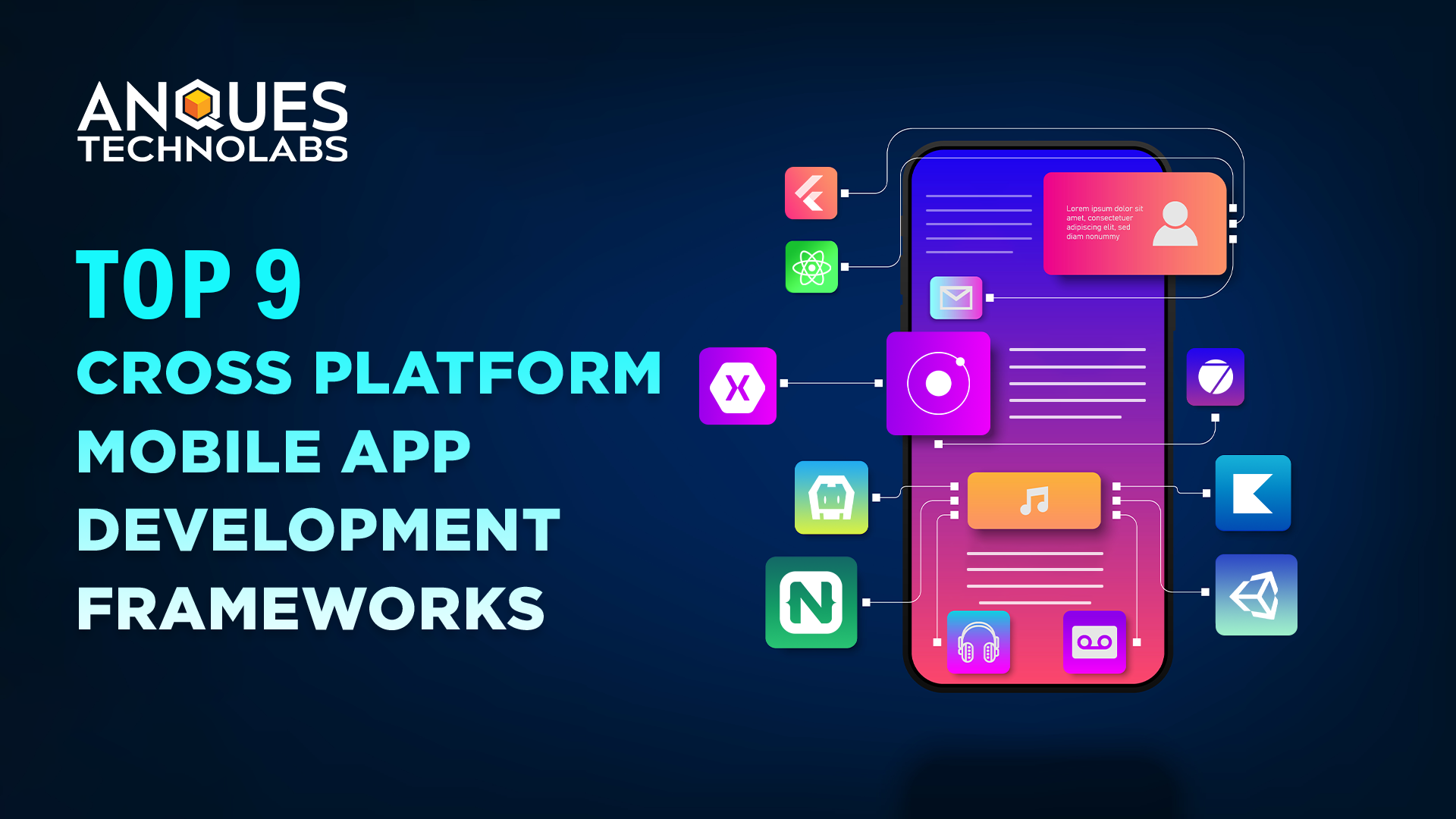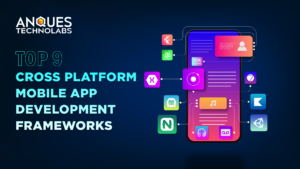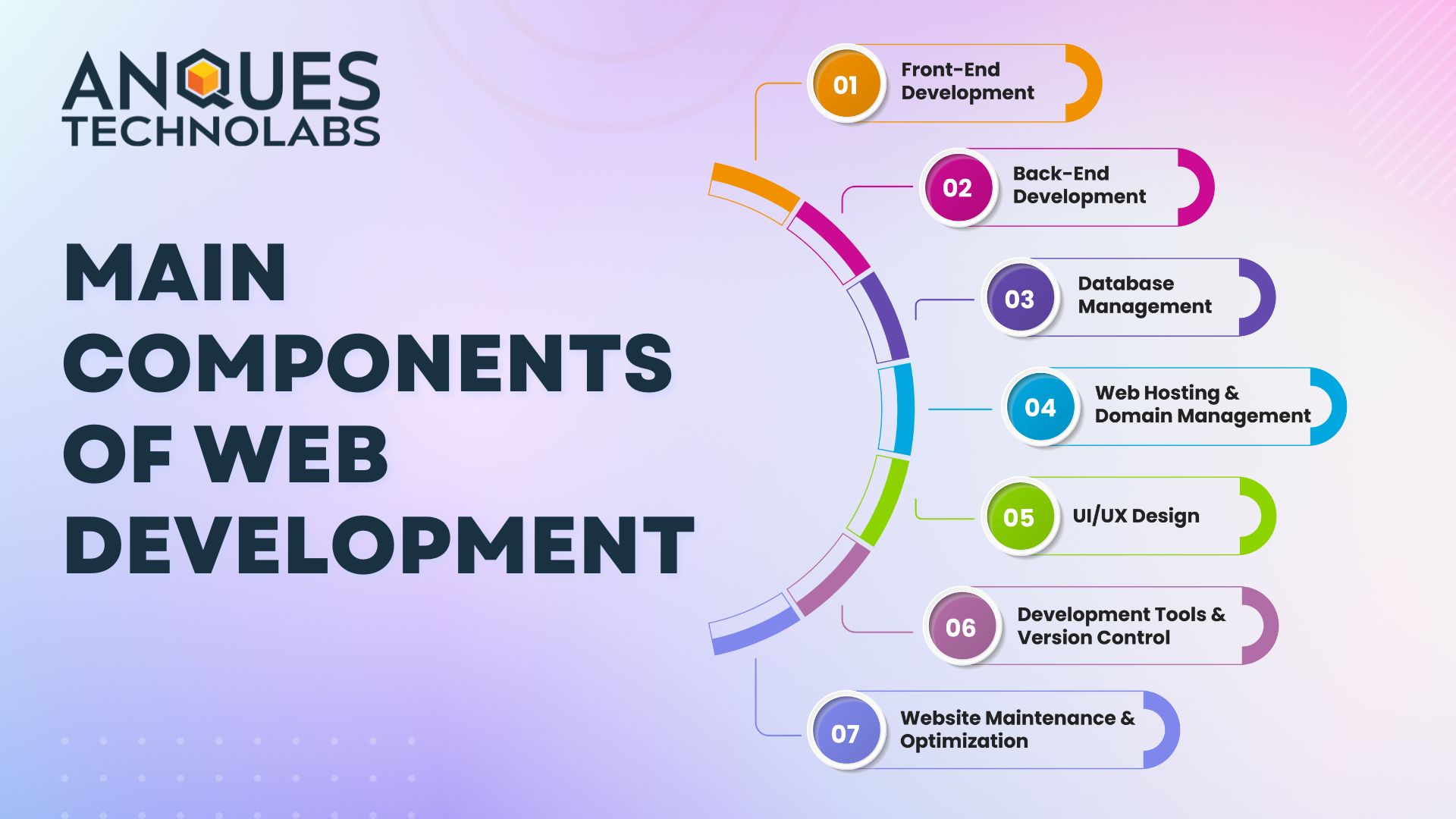Introduction
In today’s fast-paced digital world, mobile apps have become very important for businesses and startups. Creating separate apps for iOS and Android often takes a lot of time and money. This is where cross-platform mobile app development frameworks come in handy. This framework allows developers to create a single codebase that works seamlessly across different platforms. It helps in saving time, effort and cost.
This blog highlights the top 9 cross-platform mobile app development frameworks to help you make an informed choice for your next project.
What is Cross-Platform Mobile App Development?
Cross-platform mobile app development is the process of building a mobile app using a single codebase that can run on different operating systems such as iOS, Android, and the web. Developers no longer need to write separate code for each platform, making the development process easier, more efficient, and more cost-effective. Anques Technolabs is a cross-platform native solution that provides efficient and cost-effective development for both Android and iOS apps simultaneously.
Popular programming languages such as JavaScript, Dart, and C# are used in cross-platform frameworks to provide the same performance and user experience as native apps.
Benefits of Cross-Platform Development
Cost-Effectiveness
Building one application for multiple platforms reduces development costs significantly, as you only need one team to write and maintain the code.
Faster Development Process
With a single codebase, developers can accelerate the app development lifecycle and roll out apps faster to the market.
Shorter Time-to-Market
Cross-platform apps work on multiple devices and platforms, allowing businesses to target a broader audience with minimal effort.
Read more: Top 7 Most Popular Node Js Backend Frameworks
Top 9 Cross-Platform Mobile App Development Frameworks
1. Flutter
Developed By: Google
Programming Language: Dart
Flutter is one of the most popular cross-platform frameworks, enabling developers to create high-performance apps for iOS, Android, web, and desktop using a single codebase.
Features:
- Hot reload for faster development
- Beautiful, customizable widgets for UI
- Excellent performance close to native apps
- Strong community support
Best For: Startups and enterprises looking for a visually stunning, high-performance app.
2. React Native
Developed By: Facebook
Programming Language: JavaScript
React Native allows developers to create robust mobile apps for iOS and Android using a single codebase. It’s widely used and trusted by companies like Instagram, Airbnb, and Facebook.
Features:
- Strong support for reusable components
- Integration with native code for improved performance
- Large developer community and libraries
- Fast reload feature for seamless testing
Best For: Businesses that want native-like performance using JavaScript.
3. Xamarin
Developed By: Microsoft
Programming Language: C#
Xamarin is a powerful framework for building apps that provide a native-like user experience. It uses .NET and C# to develop apps that work seamlessly on iOS, Android, and Windows.
Features:
- Code sharing across platforms
- Access to native APIs for high performance
- Integration with Visual Studio
- Strong enterprise-level support
Best For: Businesses already using the Microsoft ecosystem.
4. Ionic
Developed By: Ionic Team
Programming Languages: JavaScript, HTML, CSS
Ionic is an open-source framework that focuses on creating hybrid apps with a native feel. It uses web technologies and is ideal for developers familiar with Angular, React, or Vue.js.
Features:
- Pre-designed UI components
- Integration with Cordova for native features
- Wide range of plugins for additional functionalities
- Quick app development with web technology
Best For: Businesses that prioritize quick app development with web-based tools.
5. Cordova (PhoneGap)
Developed By: Apache Software Foundation
Programming Languages: HTML, CSS, JavaScript
Cordova enables developers to build mobile apps using standard web technologies. It is ideal for hybrid mobile applications that don’t require intensive native features.
Features:
- Access to native device capabilities via plugins
- Lightweight and easy to learn
- Works seamlessly with HTML5 and CSS3
- Supports various platforms, including iOS and Android
Best For: Developers familiar with web development who want to create hybrid apps.
6. NativeScript
Developed By: Progress
Programming Languages: JavaScript, TypeScript
NativeScript allows you to build truly native apps using JavaScript or TypeScript. It provides direct access to native APIs, enabling high-performance applications.
Features:
- Integration with Angular, Vue, or React
- Native performance and UI capabilities
- Access to platform APIs without wrappers
- Strong documentation and community support
Best For: Developers who want native-like apps using JavaScript-based frameworks.
7. Framework7
Developed By: iDangero.us
Programming Languages: HTML, CSS, JavaScript
Framework7 is a user-friendly framework for building hybrid mobile apps and progressive web apps (PWAs). It’s ideal for web developers familiar with HTML, CSS, and JavaScript.
Features:
- Easy to learn for web developers
- Built-in UI components for a native look
- Seamless integration with Vue.js and React
- Supports iOS and Material Design
Best For: Small projects and PWAs requiring a simple, responsive UI.
8. Kotlin Multiplatform
Developed By: JetBrains
Programming Language: Kotlin
Kotlin Multi Platform allows developers to share code between iOS, Android, and other platforms while retaining platform-specific features.
Features:
- Code sharing for business logic and backend
- Full flexibility to use native UI frameworks
- Excellent performance with Kotlin’s modern syntax
- Strong community support
Best For: Projects requiring a mix of shared and native code.
9. Unity
Developed By: Unity Technologies
Programming Language: C#
Unity is widely used for game development but also supports building interactive cross-platform applications.
Features:
- Powerful tools for 2D/3D graphics
- Real-time development for AR/VR apps
- Support for multiple platforms, including mobile and desktop
- Strong documentation and community
Best For: Games and interactive mobile apps requiring graphics and animation.
Comparison of Popular Frameworks
| Framework | Best For | Language | Platform Support |
| Flutter | High-performance, UI | Dart | iOS, Android, Web, Desktop |
| React Native | Native-like apps | JavaScript | iOS, Android |
| Xamarin | Enterprise-level applications | C# | iOS, Android, Windows |
| Ionic | Hybrid apps with web technologies | HTML, CSS, JS | iOS, Android, Web |
| NativeScript | Native apps with JS frameworks | JS, Angular | iOS, Android |
How to Choose the Best Framework for Your App?
Key Considerations for Selection:
Project Requirements: Does your app need high performance, native features, or a quick development process?
Developer Skills: Choose frameworks aligned with your development team’s expertise.
Budget: Some frameworks reduce costs significantly compared to native development.
Conclusion
Choosing the right cross-platform mobile app development frameworks is crucial for the success of your project. Whether you focus on speed, native performance, or cost-effectiveness, frameworks like Flutter, React Native, and Xamarin provide you with powerful solutions.
Considering the project requirements, your team’s skills, and your budget, you can choose the framework that will help you build the best app and work smoothly across all platforms. If you want to create the best app within your budget, get in touch with Anques Technolabs’ team of dedicated developers now.
FAQs
What is the most popular cross-platform framework?
The most popular cross-platform framework is React Native. It allows developers to build mobile apps for both Android and iOS using a single codebase, making it efficient and widely used in the industry.
Is Flutter both frontend and backend?
Flutter is primarily a frontend framework for building mobile apps with a single codebase for both Android and iOS. It focuses on the user interface and experience, but it doesn’t handle backend development. For backend, you would need separate technologies like Node.js or Django.
Will Google replace Kotlin with Flutter?
No, Google won’t replace Kotlin with Flutter. Both are supported by Google for different purposes. Kotlin is used for native Android development, while Flutter is for cross-platform mobile app development. They serve complementary roles in Google’s ecosystem.
Which react framework is best for mobile apps?
The best React framework for mobile apps is React Native. It allows you to build mobile apps for both Android and iOS using a single codebase, providing a native-like experience across platforms.
Is Swift better than Flutter?
Swift is a native language for iOS development, offering high performance and access to all iOS features. Flutter, however, is better for cross-platform apps, allowing you to build both iOS and Android apps with a single codebase. The choice depends on your specific needs.















